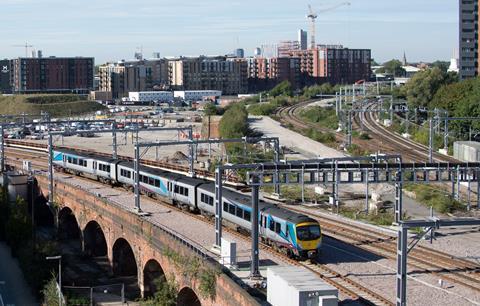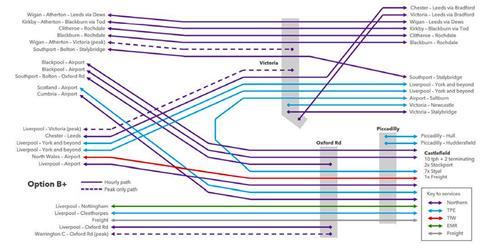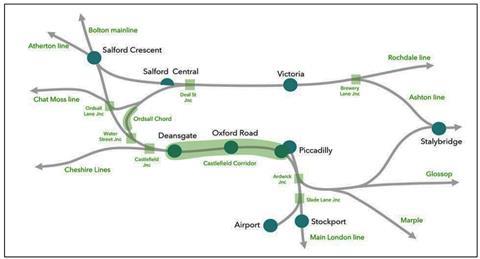
UK: Following fraught political negotiations and public consultation, agreement has been reached on the introduction of a post-pandemic timetable for the Manchester area from December 2022.
The government and policymakers across northern England have been locked in discussions for months following the conclusion of work by the Manchester Recovery Task Force, a pan-industry team set up to address timetabling issues centred on the highly constrained railway around Manchester. This has caused major reliability problems over recent years, most notably following the introduction of a timetable in December 2018 which proved largely unworkable.
Work by MRTF led to three timetable options for routes radiating from Manchester being put forward for consultation in January 2021. A slightly enhanced version of Option B, branded B+, has now been formally accepted and the fine details of service provision are being refined. MRTF says that the timetable is designed to reduce delays by 25%, improving punctuality and journey times for local passengers.
Southport and Airport
Publication of the MRTF findings led to concerns over service provision on two corridors, serving Southport and Manchester Airport. Option B+ seeks to address these by retaining two trains per hour between Southport and central Manchester, one terminating at Oxford Road and the other running to Stalybridge via Manchester Victoria. The airport meanwhile will continue to see direct services to and from Liverpool, Chester and North Wales.

Other key elements include the current Cleethorpes – Manchester Airport service being rerouted west of Manchester to serve Liverpool Lime Street instead, with some late evening and early morning trains retained to offer a direct link from Sheffield to the airport.
A more coherent service pattern would be introduced at Manchester Victoria, featuring two trains per hour from Leeds via Bradford, while a more balanced service pattern is also envisaged on routes to the south of Manchester. One of the two TransPennine Express services operating over the Ordsall Chord across Manchester city centre would be cut back to terminate at Manchester Victoria.
Infrastructure commitment
Local leaders are understood to have accepted Option B+ on the premise the government will commit to funding infrastructure enhancements around Manchester that will enable more services to run on a variety of routes from the middle of the decade.
‘I think we’ve now got appropriate comfort that there is actually going to be detailed work done on an infrastructure solution for Manchester that will see projects identified, then implemented’, said Liam Robinson, Chair of the Rail North Committee, who represented northern political leaders on MRTF.
‘The issue of central Manchester has been rumbling around the “too difficult” box for over 20 years now, and we have to actually implement a solution; that’s the point we’ve made very strongly to ministers and the Department for Transport.’

DfT has now agreed to bring forward a ‘Manchester Railmap’, a programme of potential enhancement schemes and a plan for implementing them; these proposals could include the long-planned addition of platforms 15 and 16 at Manchester Piccadilly.
‘From our perspective, if we have to accept the tough compromises on some service reductions to give us a punctual and reliable railway in the short term, it has to be in the short term and we need to make sure we’ve got a mechanism to put all of those services back’, Robinson says.
Making the best of it
Robinson admits that Option B+ is a compromise that not all local rail users will be happy with, especially on routes where service frequency drops from every 30 min to hourly. But he recognises that there is ‘no magic wand’ to boost capacity and there can be no repeat of 2018, when more services were agreed than the local network can handle.
He also defends the prioritisation of services to Manchester Airport as an important element in connecting northern England with the rest of the world, despite a perception reflected in MRTF consultation process that many rail users only take a train to Manchester Airport once a year for a summer holiday.
‘Manchester Airport is the intercontinental hub for the whole of northern England’, he suggests. ‘We certainly know that for business travel, and long distance connections and inward investment, all parts of the north do prize connectivity to Manchester Airport. That’s why we worked as hard as possible to maintain as much of that [rail] connectivity.’



